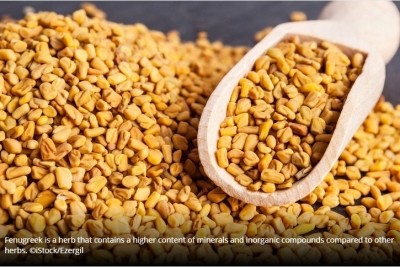Curcumin-fenugreek combo linked to improved cardiovascular health markers in obese young men

Following 12 weeks of supplementation, homocysteine levels—an amino acid present in blood that is related to cardiovascular disease risk—was lower in the curcumin-fenugreek supplemented group relative to the placebo group.
The branded ingredient combination is commercialized under the brand name CurQFen. Akay Flavours & Aromatics, which markets the CurQFen brand, funded the study and provided the supplements used during the trial.
According to the researchers, combining curcumin with soluble fenugreek fiber increases the former’s bioavailability in the human body. The placebo pill contained soluble fenugreek fiber only.
“Our data provide evidence for an enhanced bioavailable curcumin to improve homocysteine and high-density lipoprotein concentrations, which may promote favorable cardiovascular health in young, obese men,” the authors wrote in their study, published online this month ahead of print in the journal Nutrition.
These results came out of the lab of Professor Bradley Fleenor of the University of Kentucky, who has studied the branded ingredient's effects on heart health before. In 2017, for example, the Journal of Functional Foods published a clinical trial he led that found evidence that the curcumin-fenugreek formulation may improve arterial health in young obese people.
Study details
Twenty-two young and obese men participated in the study. All participants were otherwise healthy—to be eligible, they had to have no hypertension, previous myocardial infarction, diabetes mellitus, hyperglycemia, and so forth.
The intervention supplements, supplied by Akay, contained 193 mg of curcuminoids infused into 60% soluble fiber from fenugreek, while the placebo contained only the soluble fenugreek fiber.
Participants were randomized to consume 500 mg of either supplement a day for 12 weeks. Blood samples and endothelial function measures were acquired at the beginning and end of the study for comparison. Aortic blood pressure was monitored at the beginning, fourth week, eighth week, and twelfth week. They were asked to keep their regular dietary and exercise habits.
Researchers observed improvements in homocysteine levels and high-density lipoprotein concentrations, but found that changes in endothelial function were not significant.
“While improvements in CVD-related blood biomarkers are suggestive of enhanced cardiovascular health, further work is required to explore the influence of curcumin, with and without exercise, on endothelial function and central blood pressure,” they wrote.
“Curcumin may be a novel strategy to lower obesity-related cardiovascular disease risk but requires further investigation.”
Source: Nutrition
In press, accepted manuscript, https://doi.org/10.1016/j.nut.2019.01.002
“Influence of enhanced bioavailable curcumin on obesity-associated cardiovascular disease risk factors and arterial function: a double-blind, randomized-controlled trial”
Authors: Marilyn S. Campbell
















